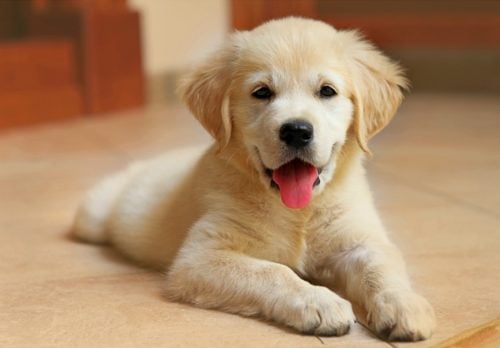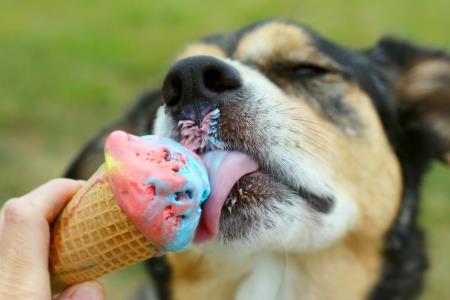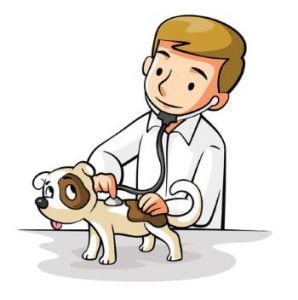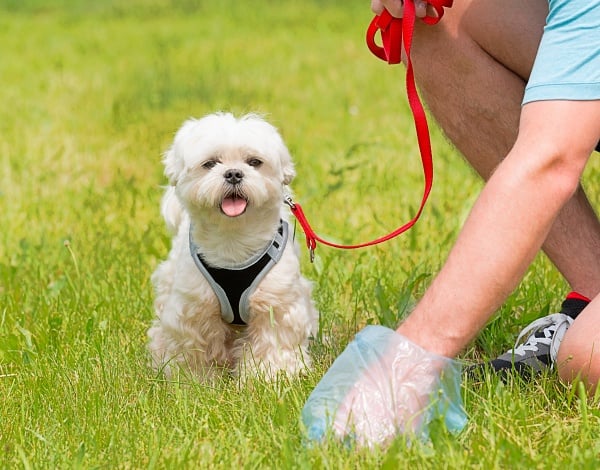Is your dog eating poop? Is that the grossest thing ever? Well, our first dog ate his own poop, then barfed it up on the carpet. Now that was the grossest thing ever.
In this article, you are going to learn about some possible causes of dogs eating feces and 6 tricks to stop your dog from eating poop.

Table of Contents
- What is coprophagia?
- Why is your dog or puppy eating poop?
- Rule out medical problems
- Is your dog constantly hungry?
- 6 Tricks to stop dogs from eating poop
- Involve a professional dog trainer
- Tricks to stop dogs from eating poop summary
- FAQ
What is coprophagia?
Coprophagia is the common dog behavior of eating feces. Most often, they consume their own excrement, but they can also eat the poop of other dogs or eat cat poop right out of the litter box.
Dogs may also eat cow excrement, rabbit poop, and the feces of other animals, and even of humans on rare occasions. So your dog only eats its own feces? Well that’s one positive thing going for you.
Coprophagia is the common behavior where a dog is a poop eater. A 2008 study found that 28% of dogs have a poop eating habit. It’s interesting to note that dogs normally poop outside of their den or home, so there is some aversion to being around it. Further, Dr. Benjamin Hart from the University of California, Davis in research presented in 2012, found that one in six dogs demonstrated serious poop eating behavior (meaning they were caught at least 5 times).
Hart presented his findings to the annual conference of the American Veterinary Society of Animal Behavior:
“Our conclusion is that eating of fresh stools is a reflection of an innate predisposition of ancestral canids living in nature that protects pack members from intestinal parasite present in feces that could occasionally be dropped in the den/rest area.“
American Veterinary Society of Animal Behavior
So it’s not your imagination. Dogs instinctively like the taste of feces. As much as it’s an unsavory behavior to us, to your dog, it’s normal behavior. It’s just undigested food. Right?
Why is your dog or puppy eating poop?
To stop the undesired behavior of poop eating, you should first identify why your dog is eating feces:

- Cleanliness and evidence disposal. Consuming their own feces is a common behavior of many animal species. Cleanliness around the nest ensures that other animals won’t detect it and limits bacterial and fungal growth. Dogs who were punished for accidentally pooping in the house may have learned to dispose of the evidence.
- Increased appetite. If your dog is suffering from a nutritional deficiency, this could be the reason for this bad habit. You may think your dog is getting enough food from their commercial diet, but if they are still experiencing weight loss, they may have other medical issues mentioned above which may be the root cause. Using the recommendations on the food package, provide the correct amount based on the pounds of body weight of your canine.
- Play behavior of a puppy. Puppies consume poop as part of their normal development. It helps them explore the world around them and learn valuable lessons (including that feces taste like well, poop).
- Taste preference. Go figure! Your dog may simply find the taste of their poop appealing. Say no more.
- Health disorders. There are many medical reasons that could be the cause of stool consumption. Especially if your dog suddenly starts to do this despite being on a balanced diet. It may be caused by an increased appetite. This can be caused by diabetes, a hypothyroidism, pancreatic issues (Exocrine pancreatic insufficiency), parasites, or irritable bowel syndrome. If you suspect that your dog may be unhealthy, consult with your veterinarian. They can run diagnostic tests to check for nutrient absorption issues, parasitic infestation, blood sugar issues, etc.. Please see below for more on this.
- Normal maternal behavior. For several reasons, mothers will eat the feces of their newborn puppies. This is completely normal and will stop on its own as the puppies grow.
Rule out medical problems
While most dogs who eat poop are healthy, medical problems should be ruled out first. Please understand that applying behavior modification when there is a medical explanation can be harmful.
To start, check for yourself if your dog’s feces are normal in consistency, size, and frequency. Increased urination can also point to medical problems associated with coprophagia.

Also, check that your dog’s body condition is normal. A dog with a nutritional deficiency may have an increased appetite for anything, including poop. Additionally, their feces may contain partially digested nutrients, making their poop palatable. Our 2nd dog had a big poop eating habit. She was healthy and happy, but we kept her on a diet to keep her slim. This was because she had arthritis in her elbows which started when she was a puppy so keeping a healthy weight was important for her joints. As such, she was always hungry and found the fecal matter of her brother delicious.
Your dog should be visually assessed by your veterinarian. Stool, urine, and blood samples may be taken to rule out any medical origins of coprophagia. If your dog eats the feces of another dog, they should both be examined. If your doctor finds any health problems that could be causing coprophagia, you should follow your veterinarian’s directions.
Only if no medical problems or undernourishment is found should you proceed with the other methods described here.
Is your dog constantly hungry?
A dog can eat feces for the same reason that they eat anything else.
If your dog is underweight, they are likely not getting enough food. This would explain why they are trying to get some extra nutrients from whatever is available. Talk with your veterinarian about your dogs weight, your dogs diet, and what should be done.
If your dog is well fed and a medical problem has been ruled out, the most probable cause is that there isn’t much else to do. Yes, they may just be bored. There are things you can do for excessive hunger in dogs.
You can try giving your dog their meals through playing exercises or use so-called slow feeders and food puzzles. You can also split your dog’s daily amount of dog food into several smaller meals. We fed our little girl part of her meal by training her and rewarded her with her kibble. This helped slow down how fast she ate.
As with any behavior problems stemming from lack of stimulation, you can start providing additional walks, playing, or other forms of activity and owner attention which are tremendously helpful.
6 Tricks to stop dogs from eating poop
In many cases, the best solution to the problem is to physically restrict your dog from having access to feces. This is especially useful if your dog happens to like the taste.

NOTE: There are all kinds of food additives on the market that claim to make the taste of your dog’s poop unappealing. We tried many to understand what might work for us as well as our patients. We found they are a waste of your money. Scientific studies show no more than a few percentage points success rates, and many customer reviews on online stores claim they are not effective. Solid reasoning: can you really make dog poop less palatable? We tried everything to test the effectiveness of such additives. From sprinkling crushed red chili pepper flakes on their poop to all the other additives. Didn’t make a difference in our little girls stool eating habit.
- If your dog eats poop in the yard, your best shot is to keep it clean. Scoop up any feces you can find and throw it out. We found that having the pooper scooper handy everytime we let our little girl out, it kept her stool eating down to a minimum.
- If your dog eats their own poop right after defecation, you must pay close attention. Normally, dogs defecate two to three times a day, usually after eating or exercise. Wait for your dog to finish and immediately call them to you. If they respond, praise them, give them a tasty treat for responding, direct their attention elsewhere, and scoop up the fresh poop to discard.
- If you are away during the day, keep your dog indoors ( no more than 10 hours at a time, less for older dogs ) and your dog will do their business before you leave and upon your return only. If your dog is relatively young and healthy, they’ll have no problems holding it. Please note that forcing your dog to hold their urine for 10 hours constantly can cause urinary tract health problems so please consult with your veterinarian.
- During a walk, if your dog loves to enjoy the poop buffet of strange dogs, this is beyond a dirty habit, they can become ill. You don’t know if that dog is healthy or may have parasites. Keep your dog on a leash, and whenever they show interest in feces, Give the command “Off!” and direct them away. Don’t be aggressive, just control the situation. Praise your dog when they respond and even give them a treat to reinforce them obeying. We used the phrase “Off!” to direct our dogs to stop whatever they are doing and sit. It saved our males life as he once bolted after a cat from our car. I screamed “Off” and he stopped on a dime and sat. Thankfully it worked as a car drove right by which likely would have injured him. I praised him and gave him a high value treat because he obeyed. As you know, walks help initiate bowel movements. Most dogs defecate during their walks. As a considerate dog owner, you only have to take a pack of plastic bags with you. Command your dog to sit and stay while you clean up so they don’t have a chance to eat it.
- If you let your dog off the leash, putting on a muzzle is an option. Each time you see your dog showing an interest in feces, call them to you and give the sit command. As always, give your dog praise and even a treat when they obey your commands. Positive reinforcement goes a long way towards solving behavioral issues.
- If your dog eats out of a litter box, you can either direct their attention to somewhere else every time they wander near it or keep the litter box out of reach. You can put the box behind a baby gate or cat door which only works if your dog is a large breed, or place a hood on top of the litter box. Keep in mind that any measure you implement to keep your dog from consuming cat poop will also create an obstacle for your cat. Make sure your cat does not start to avoid the box altogether.
Involve a professional dog trainer
Coprophagia is a complicated matter in dogs. First, you must make sure there no medical reasons causing this “natural behavior”. Once you and your veterinarian have ensured your dog is healthy, there can be multiple causes. Further, the circumstances in which it all happens can vary greatly.
Engaging the help of a certified pet behaviorist can help stop your dog from eating feces. Remember that you aren’t alone. This is a behavior problem that many pet owners struggle with.
Tricks to stop dogs from eating poop summary
Now that you understand some possible causes of dogs eating feces and 6 tricks to stop your dog from eating poop, you can take the appropriate steps towards resolving this. And make no mistake, this will will go a long way towards a happy life together for you and your pet dog. And keeping your Pet Happy is what we all want.
FAQ
Question: What is coprophagia?
Answer: Coprophagia is the behavior of dogs eating feces, including their own or that of other animals.
Question: Why do dogs eat poop?
Answer: Dogs may eat poop due to various reasons, including medical issues, nutritional deficiencies, or instinctual behavior.
Question: How can medical problems be ruled out as a cause of poop eating?
Answer: If your dog starts eating poop despite being on a balanced diet, it’s important to consult with your veterinarian to check for underlying health issues and run diagnostic tests.
Question: Is constant hunger a reason for dogs eating poop?
Answer: Yes, increased appetite caused by conditions like diabetes, hypothyroidism, pancreatic issues, parasites, or irritable bowel syndrome can lead to dogs eating poop.
Question: How can you stop your dog from eating poop?
Answer: Some tricks to stop dogs from eating poop include keeping the yard clean, immediately removing fresh poop, limiting outdoor time, keeping dogs on a leash during walks, using muzzles, and preventing access to litter boxes.
Question: Should I involve a professional dog trainer to address coprophagia?
Answer: In complex cases of coprophagia, it is recommended to involve a certified pet behaviorist or professional dog trainer for guidance and assistance in resolving the behavior.
